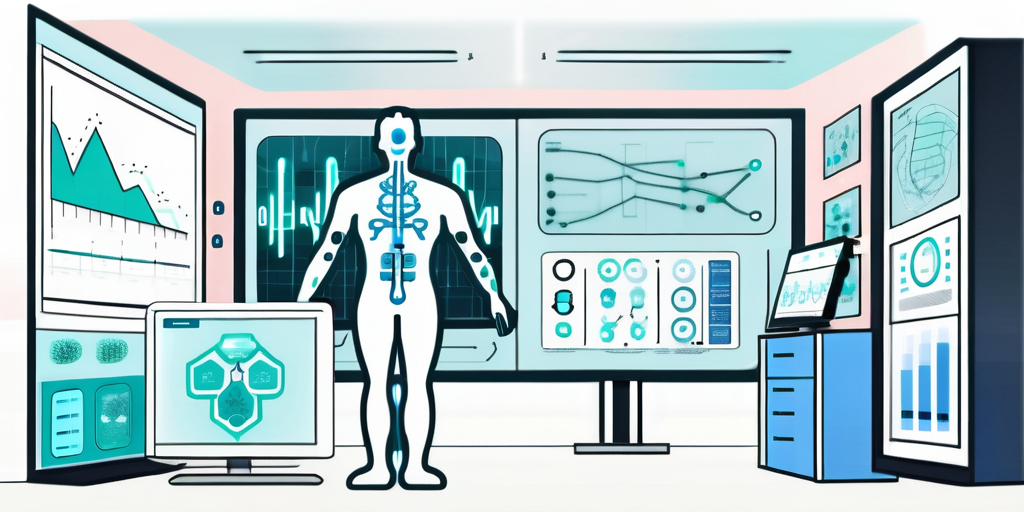In recent years, there has been a remarkable advancement in the field of healthcare, driven by the rapid integration of artificial intelligence (AI) technology. AI has emerged as a powerful tool, revolutionising various aspects of the medical industry and transforming the way clinics evaluate performance metrics. This article will delve into the role of AI in healthcare, explore its intersection with performance metrics, discuss the benefits it brings, highlight potential challenges and solutions, and finally, explore the future of AI-enhanced performance metrics in clinics.
Understanding the role of artificial intelligence in healthcare
The rise of AI in modern medicine has opened up new avenues for enhancing patient care and streamlining clinical processes. The integration of AI in healthcare enables medical professionals to harness the power of data and derive valuable insights that aid in decision-making. AI algorithms have the capability to analyse large volumes of patient data, medical records, and diagnostic images with higher accuracy and efficiency compared to human counterparts.
The application of AI technology in healthcare has shown tremendous potential in improving diagnosis accuracy, predicting disease progression, identifying treatment plans, and even assisting in surgical procedures. By automating repetitive tasks and providing real-time data analysis, AI has the capability to revolutionise healthcare metrics.
Furthermore, AI has the potential to enhance personalised medicine by tailoring treatment plans to individual patients based on their unique genetic makeup, lifestyle factors, and medical history. This level of precision medicine can lead to better patient outcomes and reduced healthcare costs in the long run. Additionally, AI-powered chatbots and virtual assistants are being developed to provide round-the-clock patient support, answer medical queries, and even schedule appointments, thereby improving overall patient experience and accessibility to healthcare services.
The intersection of AI and performance metrics
When it comes to evaluating performance in a clinical setting, performance metrics play a crucial role in assessing the quality of care provided to patients. These metrics provide critical insights into the efficiency and effectiveness of healthcare processes, enabling healthcare providers to identify areas of improvement.
Defining performance metrics in a clinical setting
Performance metrics refer to the measurable indicators that evaluate various aspects of healthcare delivery, such as patient outcomes, treatment effectiveness, waiting times, patient satisfaction, and resource utilisation. These metrics help define benchmarks and set goals for healthcare providers to strive towards, ensuring the delivery of high-quality care.
Traditionally, performance metrics have been calculated based on historical data and manual analysis. However, with the integration of AI technology, healthcare organisations can leverage real-time data and predictive analytics to enhance performance metrics.
The impact of AI on performance measurement
AI technology has the potential to greatly enhance the accuracy, efficiency, and scope of performance measurement in clinics.
By analysing large datasets, AI algorithms can identify patterns and trends that may not be easily detectable by human analysis alone. This enables healthcare providers to make data-driven decisions and implement interventions that improve patient outcomes.
In addition, AI can automate the collection and analysis of performance data, reducing the burden of manual data entry and allowing healthcare professionals to focus more on patient care. With AI, performance metrics can be measured and reported in real-time, facilitating timely interventions and continuous improvement.
Furthermore, the integration of AI in performance measurement opens up new possibilities for personalised medicine. With the ability to analyse vast amounts of patient data, AI algorithms can identify individual patient characteristics and tailor treatment plans accordingly. This personalised approach can lead to improved patient outcomes and a more efficient allocation of resources.
AI can also assist in predicting and preventing adverse events. By analysing historical data and identifying risk factors, AI algorithms can provide early warnings and alerts to healthcare providers, enabling them to take proactive measures and prevent potential complications.
Another area where AI can have a significant impact is in resource allocation. By analysing data on resource utilisation and patient demand, AI algorithms can help healthcare providers optimise the allocation of staff, equipment, and facilities. This can lead to improved efficiency, reduced waiting times, and better overall patient experience.
The integration of AI technology in performance measurement has the potential to revolutionise the healthcare industry. By leveraging real-time data, predictive analytics, and personalised medicine, AI can enhance the accuracy, efficiency, and scope of performance metrics in a clinical setting. This, in turn, can lead to improved patient outcomes, better resource allocation, and continuous quality improvement in healthcare delivery.
The benefits of AI-enhanced performance metrics
The integration of AI technology in performance metrics brings forth several benefits that can significantly impact the healthcare industry.
Artificial Intelligence (AI) has revolutionised the way performance metrics are utilised in the healthcare sector. By harnessing the power of AI, healthcare providers can unlock a myriad of advantages that enhance operational efficiency and patient care.
Improving efficiency in clinics with AI
Efficiency is a critical aspect of healthcare delivery, and AI can help optimise various processes to ensure smooth clinic operations. By automating administrative tasks, such as appointment scheduling and billing, AI can free up valuable time for healthcare providers, allowing them to focus more on patient care.
Moreover, AI can be instrumental in predicting equipment maintenance needs, ensuring that clinics can proactively address issues before they disrupt operations. This predictive maintenance approach not only minimises downtime but also extends the lifespan of medical equipment, ultimately leading to cost savings for healthcare facilities.
Furthermore, AI algorithms can analyse patient flow data to identify bottlenecks and inefficiencies, enabling clinics to make data-driven decisions to streamline workflows and reduce waiting times. This not only improves patient satisfaction but also enhances resource allocation and optimisation.
Enhancing patient care through AI metrics
AI-enhanced performance metrics enable healthcare providers to deliver personalised and targeted care to individuals. By analysing patient data, AI algorithms can identify risk factors, predict disease progression, and derive precision medicine approaches that cater to specific patient needs.
Additionally, AI can play a pivotal role in enhancing preventive care strategies. By analysing vast amounts of patient data, AI can identify patterns and trends that help healthcare providers implement proactive measures to prevent diseases and promote overall wellness in their patient population. This proactive approach not only improves health outcomes but also reduces healthcare costs in the long run.
Moreover, AI can assist in post-treatment monitoring and follow-up care. By analysing patient outcomes and feedback in real-time, healthcare providers can make necessary adjustments to treatment plans, improving patient care and overall outcomes.
Potential challenges and solutions in implementing AI metrics
While the benefits of AI-enhanced performance metrics are substantial, there are several challenges that need to be addressed for successful implementation.
Implementing AI metrics in various industries, including healthcare, has been a topic of significant discussion and debate in recent years. The integration of artificial intelligence into healthcare systems has the potential to revolutionise patient care, diagnosis, and treatment. However, along with these advancements come ethical considerations that must be carefully navigated.
Addressing the ethical implications of AI in healthcare
The use of AI in healthcare raises ethical concerns, such as data privacy, bias in algorithmic decision-making, and the potential for human oversight. It is essential to implement robust data protection measures, ensure transparency in algorithm development, and establish regulatory frameworks that address the ethical implications of AI.
Furthermore, the ethical implications of AI in healthcare extend to issues of accountability and liability. In cases where AI systems make critical decisions that impact patient outcomes, determining responsibility in the event of errors or malfunctions becomes a complex challenge. Clear guidelines and protocols must be established to address these ethical dilemmas and ensure that patient safety remains a top priority.
Overcoming technical hurdles in AI integration
Integrating AI into existing healthcare systems can pose technical challenges. Interoperability of systems, data integration, and cybersecurity are crucial factors that need to be considered during the implementation of AI-enhanced performance metrics. Collaboration between healthcare providers, technology vendors, and regulatory bodies is key to overcoming these challenges.
Moreover, the complexity of healthcare data, including its volume and variety, presents additional technical hurdles in the implementation of AI metrics. Data quality, standardisation, and governance are essential components that require careful attention to ensure the accuracy and reliability of AI-driven insights. By addressing these technical challenges proactively, organisations can maximise the benefits of AI while minimising potential risks and disruptions in healthcare delivery.
The future of AI-enhanced performance metrics in clinics
The integration of AI technology in performance metrics marks a significant milestone in the healthcare industry, but this is merely the beginning.
Artificial Intelligence (AI) has revolutionised the way healthcare providers collect and analyse data to improve patient care. By utilising AI algorithms, clinics can now predict patient outcomes with greater accuracy and efficiency, leading to more personalised treatment plans and better overall health results.
Predicting trends in AI and healthcare
As technology continues to evolve, the capabilities of AI are expected to increase exponentially. The future of AI-enhanced performance metrics will witness advancements in predictive analytics, precision medicine, and real-time monitoring, enabling healthcare providers to deliver personalised care and improve patient outcomes.
Furthermore, AI-driven technologies are anticipated to streamline administrative tasks, such as scheduling appointments and managing electronic health records, allowing healthcare professionals to focus more on patient care. This shift towards automation and data-driven decision-making is set to transform the healthcare landscape, making processes more efficient and cost-effective.
Preparing for an AI-driven future in clinical settings
Healthcare organisations must actively embrace the potential of AI-enhanced performance metrics to stay ahead in an increasingly digitised world. Collaborating with digital marketing agencies focused on healthcare marketing can help in leveraging the power of AI to optimise performance metrics and enhance the overall healthcare experience for patients.
By harnessing the potential of AI, healthcare providers can pave the way for a future where performance metrics are not just measured, but actively enhanced to refine and reshape the healthcare landscape for the better.
As we stand on the brink of a new era in healthcare, the power of AI-enhanced performance metrics cannot be overstated. At Clinic Marketing AI, led by Angelo Rosati, we understand the transformative potential of integrating artificial intelligence with healthcare marketing. With a deep-rooted commitment to excellence and a proven track record in health tech, we are poised to be your partner in navigating this digital revolution. Don’t let your clinic fall behind in harnessing the benefits of AI. Book a Call with Us today, and together, we will unlock the full potential of your clinic’s performance metrics, setting a new standard in patient care and operational efficiency.



